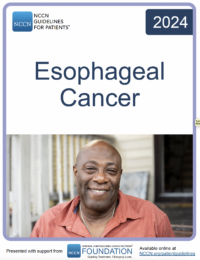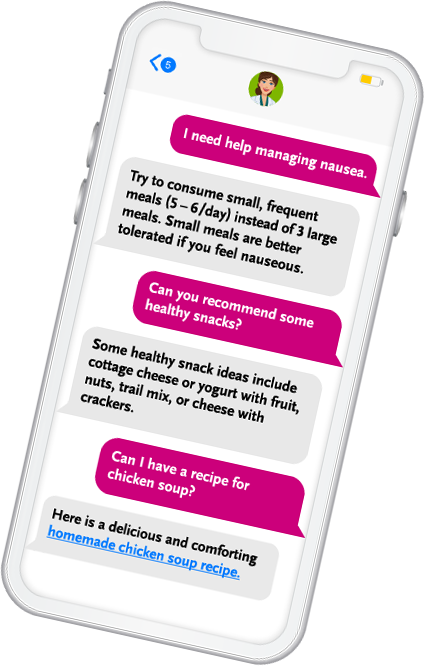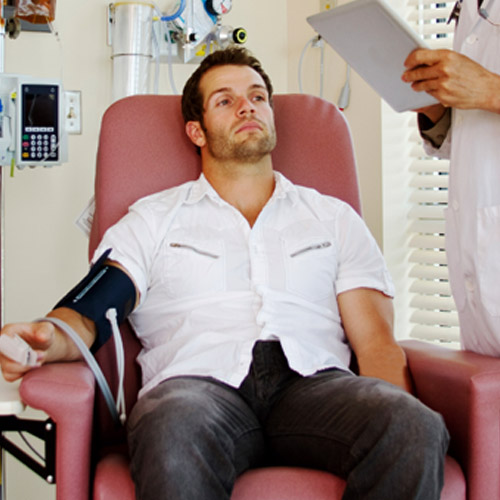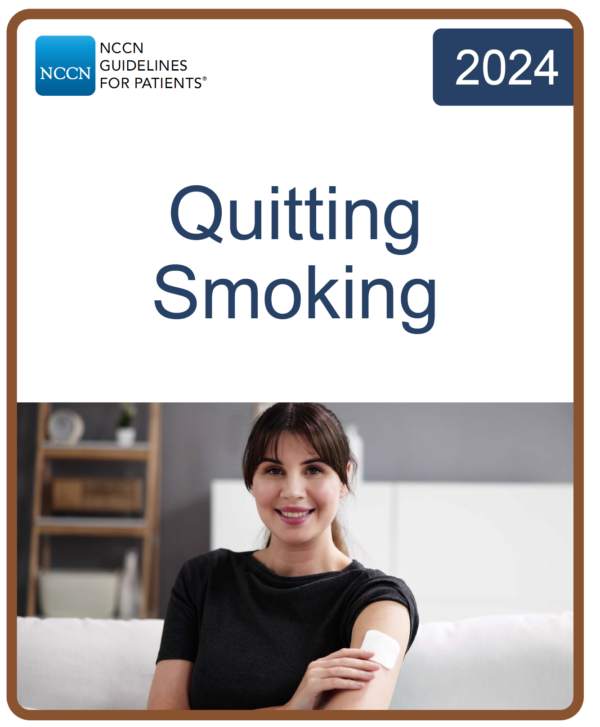Options for Treatment
NCCN Guidelines for Patients diagnosed with Esophageal Cancer
The National Comprehensive Cancer Network® (NCCN®) aims to provide people with cancer and the general public with state-of-the-art cancer treatment information in easy-to-understand language. The NCCN Guidelines for Patients® are meant to help patients with cancer talk with their physicians about the best treatment options for their disease.
NCCN Guidelines for Patients® do not replace the expertise and clinical judgment of the physician.
Nutrition Support
ECAN has partnered with Savor Health® to bring everyone in our Esophageal Cancer community the opportunity to access personalized nutrition support. We share the desire to help patients stay well-nourished with healthy eating throughout treatment and beyond.
Meet Ina® Your Intelligent Nutrition Assistant!
Her advice is designed to help cancer patients stay on treatment, prevent and manage side effects, and feel strong throughout the cancer journey.
Ina® is available On-Demand, at your fingertips 24/7 via SMS text
Whenever you’d like answers to your questions about nutrition or preventing or managing symptoms, text Ina® from your cell phone and she’ll respond with personalized nutrition tips, recipes, and answers to your questions — no phone calls or appointments necessary.
Evidence-Based Advice from Experts
Personalized nutrition and symptom management information from Ina® are clinically and contextually appropriate.
Advice from Ina® is based on scientific evidence and comes from oncology-credentialed registered dietitians, nurses, and doctors, with significant experience treating and supporting cancer patients.
Registration and unlimited, 24/7 access to Ina® is free, safe, HIPAA compliant, and secure.
Click Here to Sign up Now and Begin your Nutrition Support!
Clinical Trials
– including a Free Clinical Trials Matching Service
Clinical trials are research studies that involve people. Through cancer clinical trials, researchers find new ways to improve treatments and the quality of life for people with cancer. Clinical trials are designed to test new ways to treat cancer, detect and diagnose cancer, prevent cancer and manage the symptoms of cancer and side effects of treatment.
At the ECAN Clinical Trials portal, you can find details of how clinical trials work and hear from an Esophageal Cancer patient who has participated in a clinical trial. The portal also provides an easy-to-navigate platform where you can search for the clinical trials in your geographic area for which you may qualify.
If you are interested in exploring Clinical Trials, ECAN has partnered with Massive Bio to provide a Free Clinical Trials Matching Service where you will gain expert assistance in finding the best clinical trial for you and personal support to help you through the entire process.
National Cancer Institute provides a variety of information about Clinical Trials, including those that are available and the results of clinical trials already completed.
Quitting Smoking
– Important for Survival of Esophageal Cancer
NCCN Guidelines for Patients – Quitting Smoking
The National Comprehensive Cancer Network® (NCCN®) provides recommendations for quitting smoking based on research and expert advice.
The Downside of Smoking for Esophageal Cancer Patients: Smoking interferes with your body’s response to treatment. Besides reducing the benefits of treatment, smoking can also make side effects worse. It also increases the chance that your cancer will come back or that you will develop a second cancer.
*Survival Outcomes of an Early Intervention Smoking Cessation Treatment After a Cancer Diagnosis Paul M. Cinciripini, PhD; George Kypriotakis, PhD; Janice A. Blalock, PhD; et al JAMA Oncol. Published online October 31, 2024. doi:10.1001/jamaoncol.2024.4890
Resources for Patients & Access to Immunotherapy
In this webinar, learn about the assistance available to cancer patients to ensure they get access to the best treatment available by gaining insurance coverage – or access when they don’t have insurance.
Kimberly Martin, Associate Director of Reimbursement Operations at Bristol-Myers Squibb provides insight into expediting approvals, reducing out-of-pocket costs, and resources for uninsured patients, too. She shares information about how you can find the best insurance plan for your personal situation.
Ms. Martin also provides information about a wealth of resources that are available to patients and caregivers that may help them through the cancer journey, including financial help for basics, transportation, and other benefits that are often hard to find.
This webinar was recorded December 6, 2022.
Assistance with Medication Costs
If you have financial concerns about paying for your medications, the National Comprehensive Cancer Network provides a Virtual Reimbursement Resource Room to help you find financial assistance to cover those costs. For instance, if you have been prescribed Xeloda, there may be help available to you here. If you have been prescribed Herceptin, click here to find out more.
Needy Meds is a non-profit organization that maintains a website with free information on programs for people who aren’t able to afford medications and/or healthcare costs.
Partnership for Prescription Assistance helps qualifying patients without prescription drug coverage get the medicines they need by providing information regarding hundreds of programs tailored for different needs and conditions.
Financial Assistance and Case Management
Patient Advocate Foundation offers individualized and sustained case management services to those in need from all areas of the United States who are challenged with debilitating diseases. PAF also has limited funds for co-pay assistance and other financial aid. The PAF website is a good source of information regarding insurance coverage, appeals, and disability insurance claims.
The Cancer Support Community is an international non-profit dedicated to providing support, education and hope to people affected by cancer. The CSC has information and assistance in dealing with the financial aspects of cancer. The CSC also staffs a toll-free Helpline that provides a wide variety of information about cancer treatment, support, and practical issues faced by patients and families Mon – Fri 9 am -9 pm ET at 1-888-793-9355.
Cancer Care may be able to provide you with financial assistance with transportation, home health care, and child care.
The Patient Travel Referral program, a program of Mercy Medical Angels, aims to “ensure that no financially needy patient is denied access to distant specialized medical evaluation, diagnosis or treatment for lack of a means.” The program provides information on various forms of charitable, long-distance medically-related transportation and referrals to sources in the national charitable medical transportation network.
Hope Lodge is a service of the American Cancer Society. Lodges throughout the country provide temporary free housing for cancer patients who need outpatient treatment. The emphasis is on providing a nurturing, home-like environment that is conducive to healing.
Road to Recovery, another program of the American Cancer Society, provides transportation to treatments locally for cancer patients who need it.
Cancer Financial Assistance Coalition (CFAC) is a coalition of financial assistance organizations. While CFAC cannot respond to individual requests for assistance, the group maintains a database of resources searchable by diagnosis, type of aid (housing, expenses, prosthetics), and zip code.
Joe’s House is a nonprofit organization providing a nationwide online service that helps cancer patients and their families find lodging near treatments centers. Their website lists cancer treatment centers and hospitals around the country with nearby lodging facilities that offer a discount. The site also lists lodging chain partners offering discounts.
Cancer Finances is a partnership between Triage Cancer and the Samfund that provides an online toolkit to assist cancer patients and survivors in making sound financial decisions before, during, and after treatment.
Opportunity for Esophageal Cancer Patients to obtain Free Comprehensive Genomic Profiling
TRACK is an innovative program from our friends at the Target Cancer Foundation for patients with rare cancers like Esophageal Cancer that allows patients to enroll from home and receive personalized, actionable genomic information about their cancer along with recommendations for on-label, off-label, or clinical trial options that could inform their treatment plan.
Watch ECAN’s recent webinar with Target Cancer’s Executive Director Jim Palma and learn the details of this rare opportunity that can be very beneficial for Esophageal Cancer patients. You can also reach out to Target Cancer to learn more about the TRACK program at track@targetcancerfoundation.org or by phone at 617-299-0389.
A Community of Support
If you have received a diagnosis of Esophageal Cancer from your doctor, know that there is a community of people standing by ready to support you through this journey. Find out more about ECAN’s partnership with Smart Patients to provide a community of support or sign up here.




